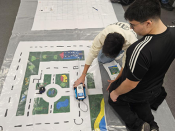The field of Metabolic Engineering (ME) has gained a major importance, since it allows the design of improved microorganisms for industrial applications, starting with wild-type strains that usually have low production capabilities in terms of the target compounds. The ultimate aim of ME is to identify genetic manipulations in silico leading to improved microbial strains, that can be implemented using novel molecular biology techniques. This task, however, is a complex one, requiring the existence of reliable metabolic models for strain simulation and robust optimization algorithms for target identification.
Strain simulation is usually performed by using Genome-scale stoichiometric models and Linear or Quadratic Programing methods that assume a steady state over the intracellular metabolites. Strain design adds one level of complexity as it requires the formulation of bi-level optimization problems that can be tackled with Evolutionary algorithms.
In this talk, I will go through the main concepts of genome-scale modelling and the simulation and design of microbial cell factories while describing our group’s main contributions to the field.
Short Bio: Isabel Rocha teaches Bioinformatics and Systems Biology at Minho University where she is the PI of several projects in Systems Biology applied to Industrial Biotechnology and Life Sciences, with more than 100 papers published in international journals, books and international conferences. She did her PhD in Chemical and Biological Engineering at Minho University in Portugal and a Post-Doc in Systems Biology at the Technical University of Denmark. She spent one semester at MIT and she is part of the MIT-Portugal Program Faculty, being the head of a National program in Teaching innovation and entrepreneurship. She is co-founder and Scientific Director of both SilicoLife and Biotempo. Biotempo is focused on Bioprocess Development for the food industry while SilicoLife develops improved microbial strains for industrial applications using in silico methods.






















